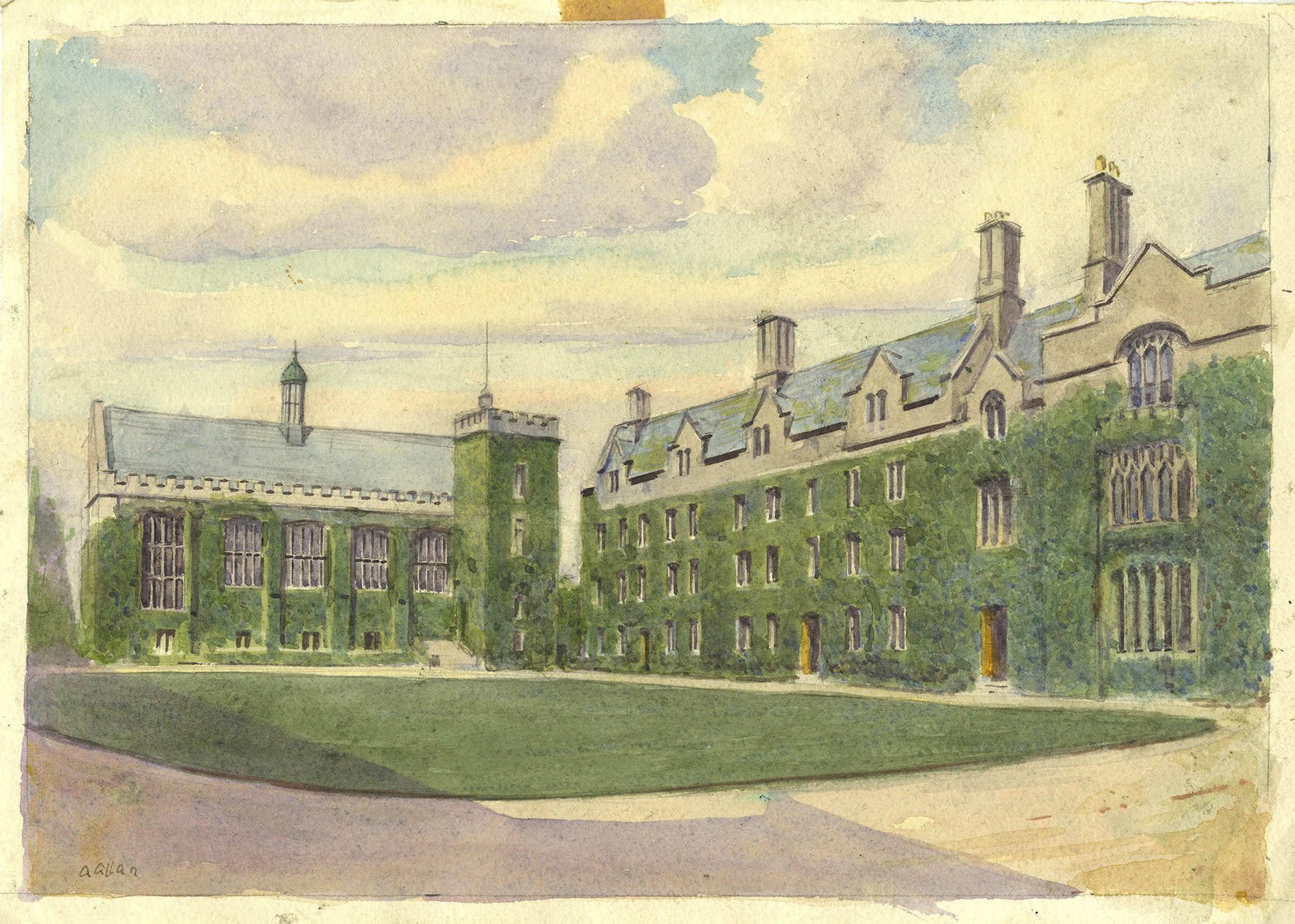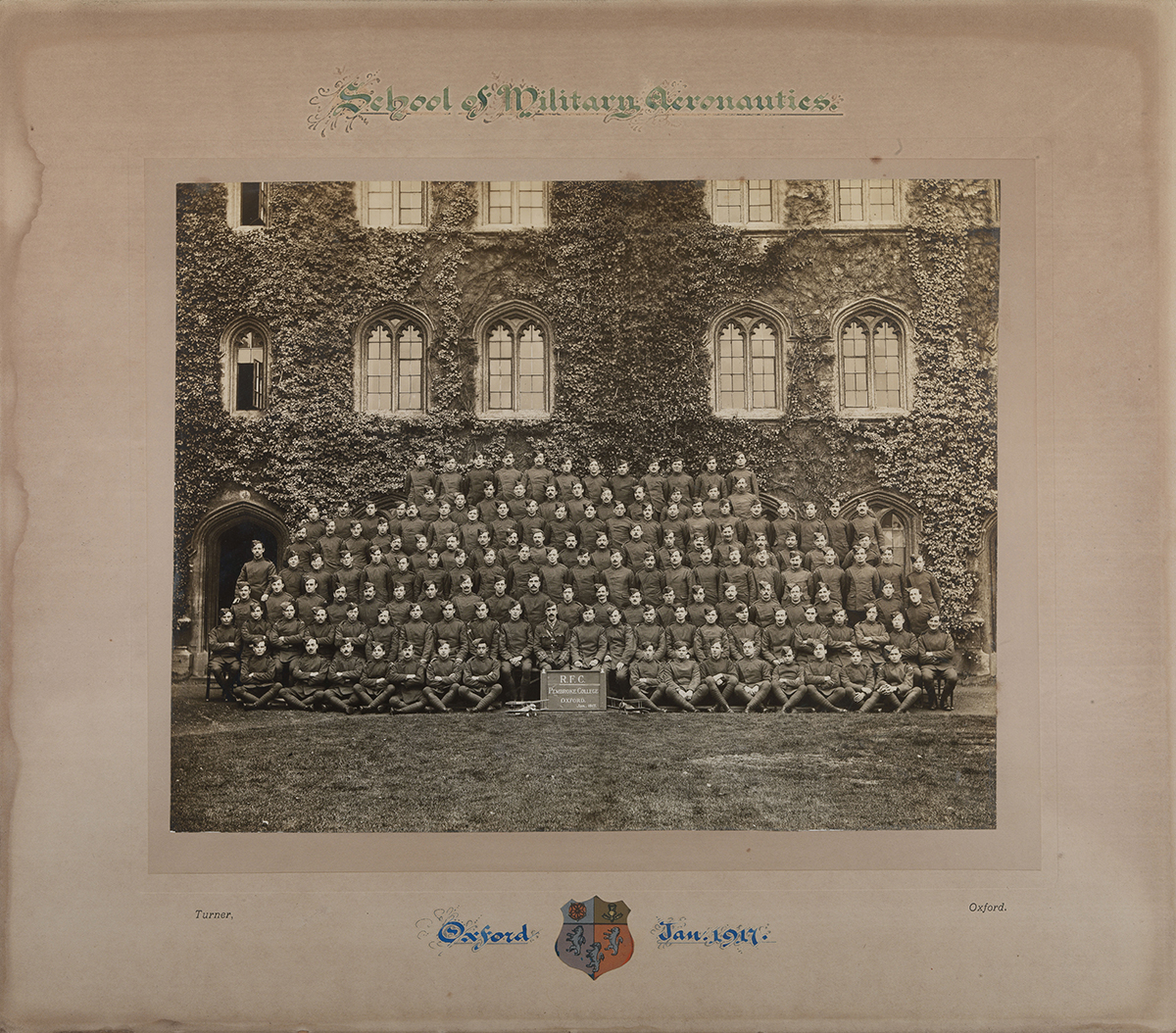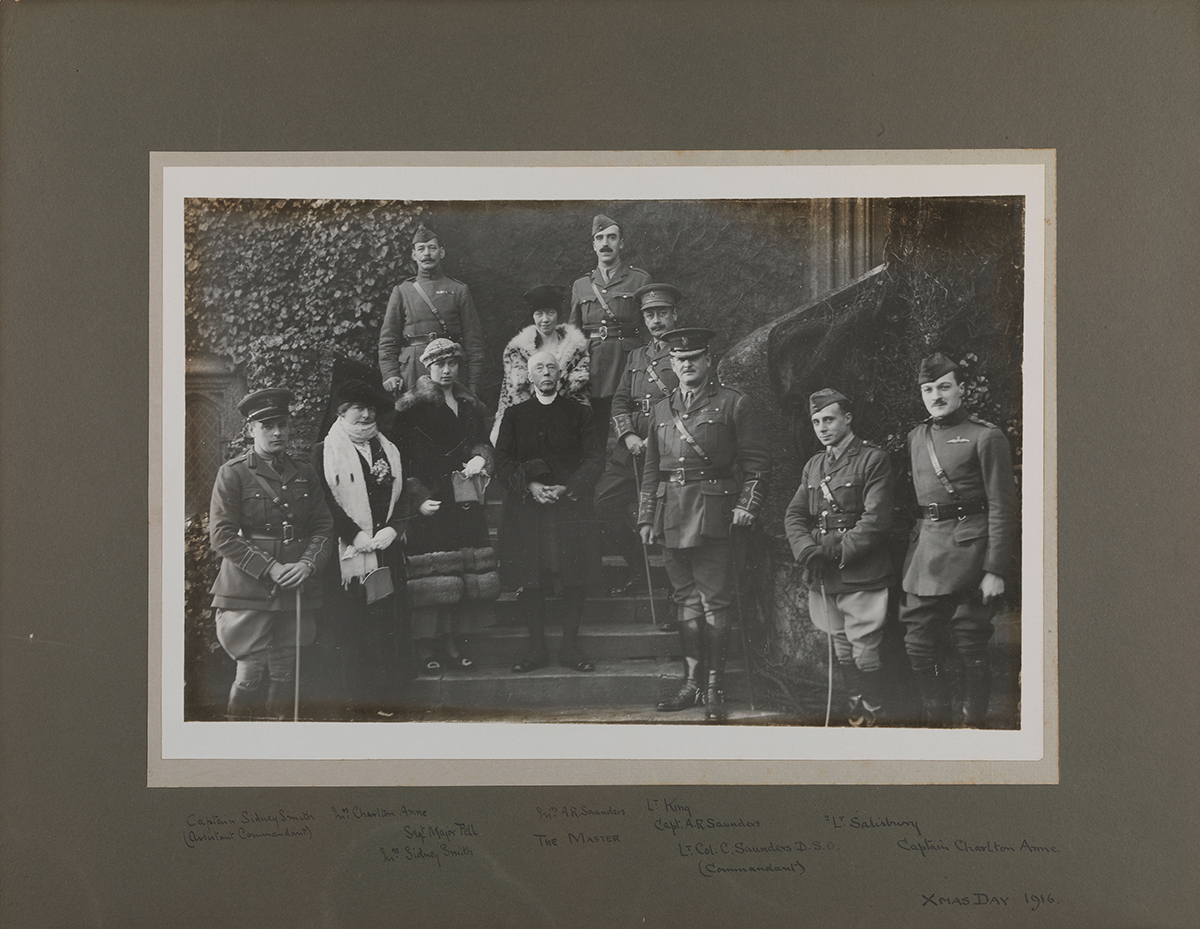The College in War Time

Despite the dramatic impact that WWI had on the life of Pembroke College, very little evidence is to be found in the contemporary material that survives in the College Archive. Governing Body minutes provide few details, there is no personal correspondence and very little administrative documentation. Nevertheless, in this section, we will share what can be found, and place it in the wider context of Oxford during the war.
On 16th March 1915, the Universities and Colleges (Emergency Powers) Act was passed which extended the powers of the Universities of Oxford and Cambridge, and their Colleges, to make statutes for purposes related to the war. These allowed for greater flexibility in the management of finances, academic positions, prizes and awards. On 24th May 1915, Pembroke College’s Governing Body passed its own Emergency Statute which was approved by the Visitor, Lord Curzon, on 12th June. This reflected the University Act and gave the College the freedom, for example, to suspend scholarships and apply the resulting funds where most needed, including the relief of members of the College. It also allowed them to extend the tenure of scholarships, change the conditions of and eligibility for awards and to take into account the war service of award holders.
However, some of these issues had already been addressed – at a Governing Body meeting on 10th October 1914, "It was Resolved that all Scholars and Exhibitioners of the College absent on military service should be permitted to resume the tenure of their Scholarships or Exhibitions as soon as their services are no longer required by the country, and that their period of absence should not be counted against them." And on November 4, "It was Ordered that a Special Fund be created, containing the stipends of all those Scholars and Exhibitioners who are absent on military service, and that a separate account of these be kept".
The drastic reduction in the number of students substantially reduced the income available to all Colleges but this had particular effect on Pembroke which did not have a large endowment or significant land holdings. On 6th September 1915, the Master received a letter from Herbert Warren, the president of Magdalen College, offering a gift of money to Pembroke from their surplus revenues. In his letter, he expressed his awareness of the financially straightened position that some of the colleges found themselves in as a result of the war and hoped that "Pembroke will not think us patronizing or interfering" in offering help. In the event, Warren’s letter was presented to Governing Body on 20th October and the offer was gratefully accepted. This was followed by further grants in June 1916, 1917 and 1918.

War broke out during the long vacation of 1914 and its effects can be immediately seen in the drop in matriculations for the October of that year. In 1913, thirty-five students had matriculated but, in 1914, this had dropped to seventeen. For the next three years, matriculations were in single figures and 1918 saw twelve students come up. A clear representation of this can be seen in the room rent books where empty rooms begin to spring up. Suddenly, in 1916, the thirteen remaining students are herded into one area of College (now Chapel Quad). Although the remaining rooms in Old Quad are left blank in the book, they were, in fact, requisitioned by the military under the Defence of the Realm Act. In December 1915, the Royal Flying Corps had opened a facility at the University of Reading for training flight instructors. In October of the following year the school was expanded to include cadet pilot and observer training, was designated No 1 School of Military Aeronautics and, at the same time, a second school was opened in Oxford. This school commandeered rooms, not only at Pembroke but also at several other Colleges, including Brasenose, Christ Church, Corpus Christi, Exeter, Jesus, Lincoln and Queen’s.
Oxford also showed its support for the allied cause by offering aid to some of the Belgian and Serbian refugees who arrived in Britain in 1914 and 1915. Two hundred Belgian and 150 Serbian refugees arrived in Oxford and the colleges rallied round to provide support. In the Governing Body minutes of 10th March 1915, it is recorded that a letter was read "from Miss Eleanor R. Price, asking the College to lend furniture, bedding, crockery, & various utensils for the use of Belgian refugees in Oxford. It was Resolved that Miss Price be informed that she can borrow from the College such crockery as can be spared for the purpose". Lectures were also held at Pembroke as part of a ‘Kosovo day’ on 28th June 1916 to celebrate Serbian Independence Day.
It was not until 1916 that the College addressed concerns about its own vulnerability to enemy aircraft. At a Governing Body meeting of 15th March 1916 "It was Resolved that the College buildings and Oxford property be insured against damage from aircraft; and the Bursar was authorised to consult with Mr. Cuthbert Lake and take out a policy of insurance in accordance with his advice". At a meeting of 3rd May, it was reported that a policy had been taken out with Lloyd’s "for £10,000 at a premium of £15.0s.6d, subject to possible minor adjustments, to insure the College fabric, No.94 St Aldate’s, Nos. 12, 13 & 14 Pembroke Street, & No.11 Beef Lane against damage from enemy aircraft". As well as protecting the fabric of the College, consideration was also given to its staff. On 8th December, the Servants’ Committee presented a report to Governing Body, suggesting the allocation of a sum of £55.10s "to the relief of those servants on the staircases who were suffering from the effects of war". This was approved and further grants were made throughout the war.
After the war, there was a huge influx of students to the University, both new and returning. From twelve matriculations in 1918, there was a peak of 102 in 1919 which included American Officer Students, accepted for two terms’ course of study. The college was also asked to accept the normal number of Rhodes Scholars twice a year in 1920 and 1921 to which it agreed. Returning students were given the privilege of counting military service against the residence requirements for their degrees

Another major post-war change was to the Junior Common Room (JCR). The original JCR had been established in 1795 as an exclusive wine club, membership being by election under an elected Steward, and one former member, H.H. Longuet-Higgins (m.1904), remarked, in retrospect, "One could say much about its exclusiveness, how it tended to belong to the 'bloods' and to set itself up as a sort of repository of tradition and authority, not unlike the prefects room at some schools. In good years it could be good, but when money and idleness were in control, the good elements avoided it, and the other was left in control". An attempt to establish an alternative club - the short-lived '1913' Club - came to nothing, but, after WWI, a new JCR, open to all junior members, was created and the assets of the old JCR were sold to create a trust fund, which made occasional grants for general College purposes.
Governing Body
As one of the smaller Oxford Colleges, Pembroke only had ten Fellowships on the books in 1914, three of which were already vacant.
|
1. At the outbreak of war, Bishop John Mitchinson was Master of Pembroke College and had been since 1899. Immediately prior to this, he had held the College living of Sibstone, Leicestershire, where he was rector from 1881 to 1899 after his retirement as Bishop of Barbados. Sadly, he did not live to see the end of the war. He died on 25th September 1918, at his Gloucester residence, just weeks before the armistice on 11th November. |
|
2. Charles Leudesdorf (Vicegerent) - a Fellow of Pembroke College from 1873, Leudesdorf was a mathematician, teaching the subject at Pembroke until his appointment as University Registrar in 1906. From 1889 to 1906, he was also Secretary to the University's Boards of Faculties. He was Registrar until his death in 1924. |
|
3. George Wood – elected to a Fellowship at Pembroke in 1875, Wood became a Barrister in 1878. He was College Bursar 1894-1922 and also acted as Librarian. He died on 3rd August 1924 |
|
4. Walter Ramsden – although the holder of the Sheppard Prize Fellowship in Medicine, attached to Pembroke College, Ramsden was not required to teach or to be in residence and he took up a position at Liverpool University in 1914, returning to Pembroke on his retirement in 1931. Here he remained until his death in March 1947. |
|
5. Herbert Lionel Drake – Classics Fellow from 1907 to 1949, Drake also became Senior Tutor in 1912 and, eventually, took over as Vicegerent on the death of Charles Leudesdorf. Drake was also Steward of the Senior Common Room and was responsible for Pembroke’s reputation for having the best wine in the University. There was no administrative or secretarial support at this time and Drake effectively ran the academic life of the college. The entries in the matriculation register recording the deaths of those killed in WWI are in Drake’s elegant hand and his long tenure meant that he experienced the losses of both World Wars. He died on 27th February 1958 having been a Fellow of Pembroke for fifty-one years. |
|
6. Rev. Gerald Burton Allen (Tutor, Dean and Chaplain) – elected in 1910 and known by the nickname ‘Puffles’, Allen was appointed to a military chaplaincy in early 1917. On his return, Allen took his BD and presented the College with a cross whose Latin inscription recorded his protection amid many dangers, “inter multa pericula protectus.” Pembroke immediately chose him as Senior Proctor and he was still in this office when elected Principal of St Edmund Hall on Armistice Day, November 1920. From here Allen moved to the Salisbury Diocese on being consecrated Bishop Suffragan of Sherborne in 1928, having taken the DD degree in 1923. Pembroke made him an Honorary Fellow in 1934. He returned to Oxford in 1936 as Bishop Suffragan of Dorchester and Canon of Christ Church. He retired in 1952 and died four years later. |
|
7. John Rankine Brown – was elected to the position of Lecturer in Classics and Ancient History and Junior Bursar in October 1911. He left Pembroke for the front line in 1915 and died on active service on 23rd April 1917. More information can be found about him in the Roll of Honour section of this site. |
|
8. Robin George Collingwood had only taken up his Fellowship in Classics and Philosophy at Pembroke in 1912. Fluent in German, poor health and eyesight saved him from active service and he volunteered in 1916 for a position with Admiralty Intelligence, then operating out of the Royal Geographical Society. After the war, he continued at Pembroke until, in 1935, he was elected to the Waynflete Professorship of Metaphysics, entailing a move to Magdalen College. Continuing health problems led him to resign the chair in 1941 and he died on 9th January 1943. |





